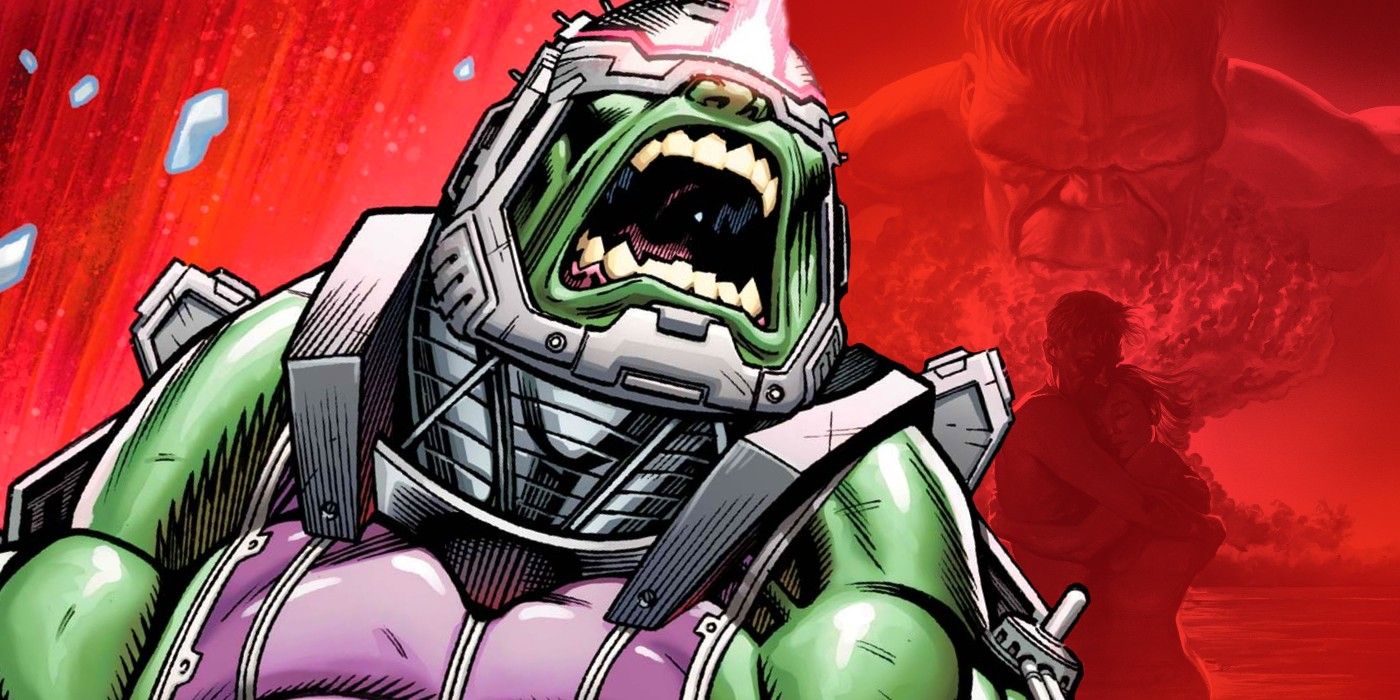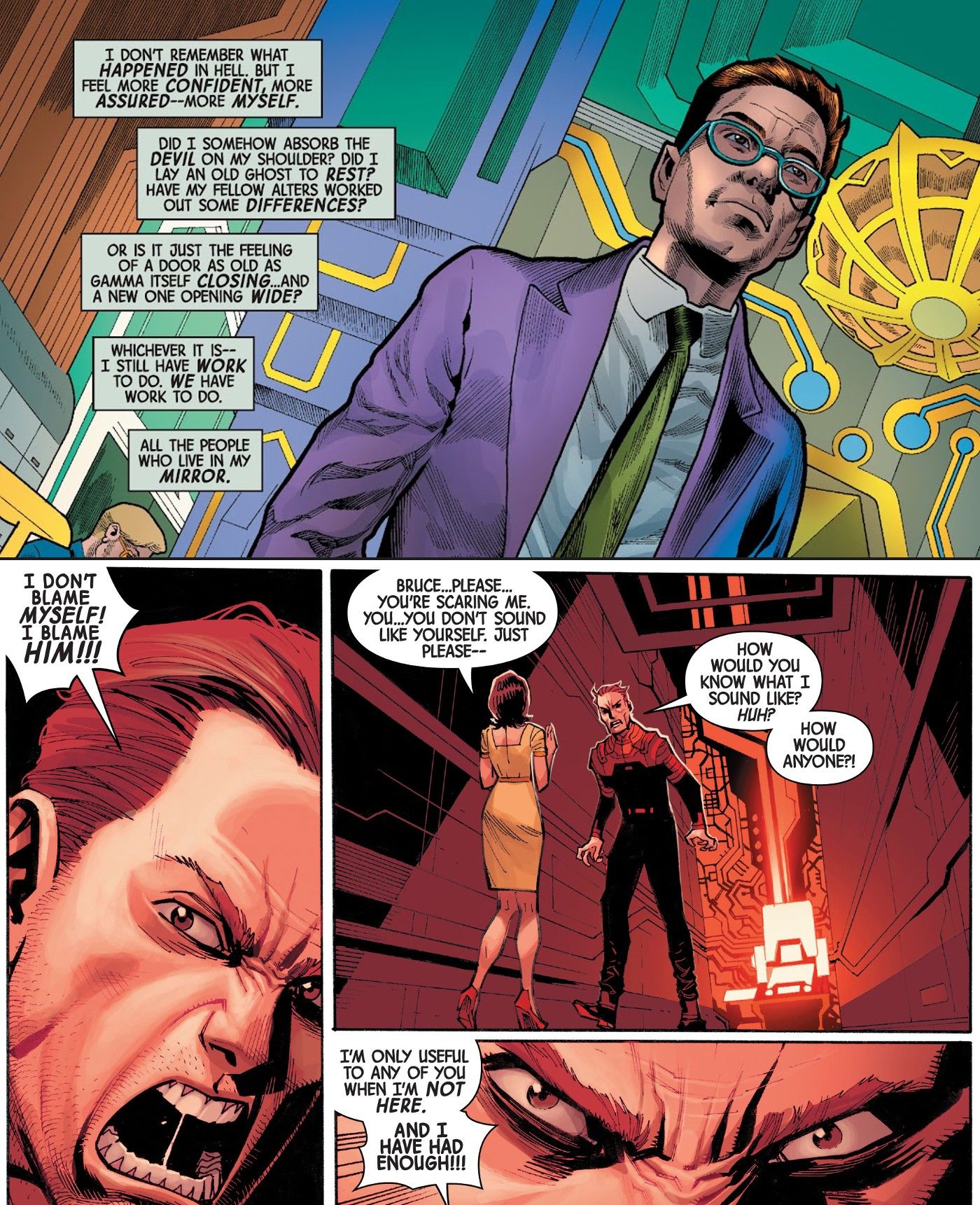Warning: contains spoilers for Immortal Hulk #50 and Hulk #1!
Many fans of Marvel's Immortal Hulk were worried about Donny Cates and Ryan Ottley's new Hulk series. Following on almost immediately from what's already considered a modern classic, there was fear that Cates' previous work predicted an immediate divergence from the dark, philosophical, pathos-laden comic saga that had brought an incredible amount of humanity not just to Bruce Banner, but to all his Hulk personas. Now, with the release of Hulk #1, it's clear that for better or worse, those fears were well-founded.
Al Ewing and Joe Bennett's Immortal Hulk took the Jade Giant's existing history and gave it new meaning, introducing the influence of an eldritch god known as the One-Below-All. The classic Savage Hulk persona was revealed to be Bruce's child self - doomed to be constantly attacked without understanding why - while alternate personas Sunshine Joe and Devil Hulk were depicted as protective figures who formed during Bruce's youth, eventually given physical form by the gamma bomb that transformed him. Action-packed and with a penchant for body horror, Immortal Hulk nevertheless engaged with weighty themes, and ended with Hulk earning a second chance through an act of forgiveness, with Banner's surviving Hulk personas uniting and inspiring him to embark on what was teased as a new era of heroism.
In contrast, Hulk #1 begins with the thesis, "What if Hulk exists to protect us from Banner?", once again setting the two at odds. This version of Hulk is familiar to fans, taking a similar approach to Jason Aaron's tenure on The Incredible Hulk (as well as plenty of classic stories.) So far Banner is portrayed as the series’ main villain, having separated himself into three distinct entities. Dr. Strange explains that Hulk’s body has essentially become like a "starship" or "smashstronaut" with Banner’s mind piloting it like a captain in a command center. The third entity is the Hulk, who Banner has locked in a torture chamber "engine room." In this mental scenario, Banner can attack Hulk with an army, increasing his rage, which in turn fuels the strength of the body he's piloting. It’s a wild concept, but nothing readers wouldn’t expect from Cates.
Cates effectively jettisons Immortal Hulk's ending, with the instant change apparent in few places more than the fact Banner ends Immortal Hulk #50 saying, "I feel more confident, more assured -- more myself," and Hulk #1 begins with an imagined Betty Ross observing, "You're scaring me. You... You don't sound like yourself." The change is of course Cates and Ottley's prerogative in telling their own story, but it's also exactly what many fans were concerned the new era would bring.
After his fan-favorite and commercially successful run on Venom, which climaxed with the blockbuster crossover event King in Black, Donny Cates has come to be seen as a writer who redefines characters with expansive new lore. In order to live up to such a role, writers are expected to tear down preconceived notions of a character and build them back up, as Ewing and Bennett did with Immortal Hulk. Indeed, Hulk is an enjoyable comic with its own story to tell, but the disconnect between the two series highlights how bizarre it is for comic fans to continue following a character's journey only for its tone, characters, and perhaps even core philosophy to change in an instant.
There are many readers for who this isn't a problem. New reader are offered a fresh jumping-on point, and Cates has built up a following of loyal fans who will trust whatever direction he decides to take with the series. Following up on the immensely popular Immortal Hulk was always going to be a challenge, and perhaps it was a wise move to steer clear of its legacy rather than continue it. At the same time, Marvel's trend towards discrete creator runs rather than different creators truly handing off an ongoing story remains a huge bone of contention for many fans, and Cates and Ottley's Hulk is likely to remain a lightning rod for that debate.


